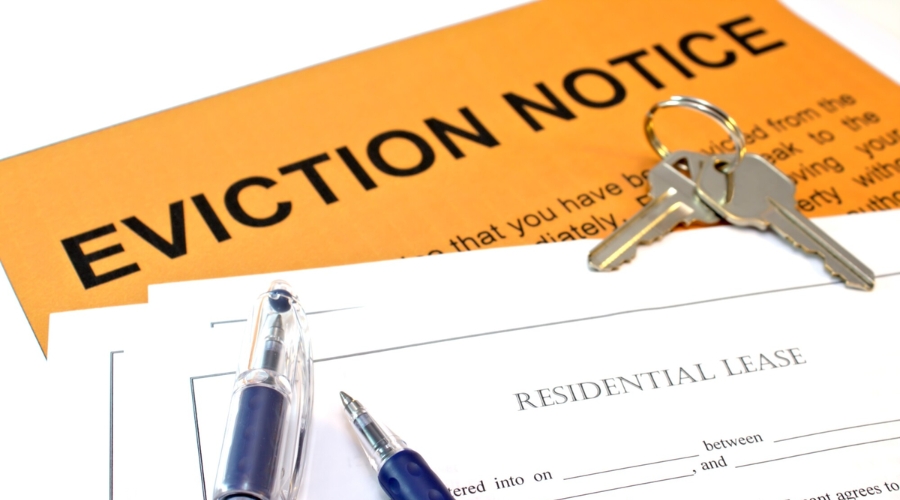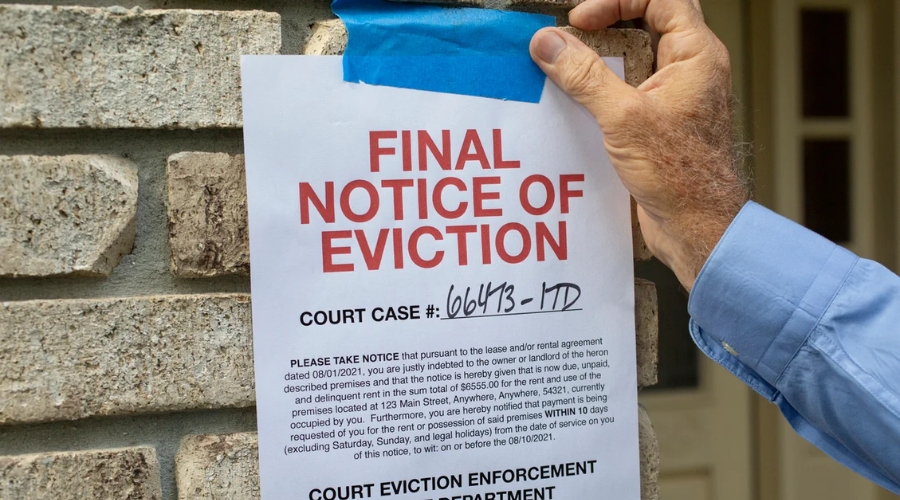Are you a landlord trying to navigate the eviction process in Mississippi this year? With updated laws and stricter court procedures in 2025, understanding each step is more important than ever. From serving legal notices to securing a court-ordered writ of possession, Leaser Runner’s guide breaks down everything landlords need to know—clearly and legally. Stay compliant, avoid costly mistakes, and learn how to protect your rental property with confidence.
New Mississippi Eviction Laws Updates for 2025
As of 2025, Mississippi laws have been updated to include key changes that affect both landlords and tenants during the eviction process. Understanding these legal changes is essential for ensuring compliance and avoiding costly legal mistakes.

Notice Period Requirement (MS Code §89-8)
One of the most important changes comes from the Landlord and Tenant Act update, particularly MS Code §89‑8. According to MS Code, landlords are legally required to issue a written notice before ending a lease due to tenant violations. For nonpayment of rent, tenants must be given at least three days to either pay the overdue amount or vacate the unit.
In cases involving a breach of other lease terms, a 14-day written notice is required, allowing the tenant to correct the violation. However, if a similar breach occurs within six months, the landlord may serve a 14-day unconditional quit notice, meaning the tenant must leave with no opportunity to fix the issue.
Additionally, when a lease ends lawfully, landlords are obligated to return any unused prepaid rent and security deposits, minus lawful deductions. If the tenant leaves personal belongings behind, landlords must follow proper disposal legal procedures, giving the tenant a reasonable time to reclaim the items.
These updates reinforce fairness while clarifying the steps in the eviction process in Mississippi, helping property owners stay compliant while safeguarding tenant rights and avoiding unlawful detainer risks.
Landlord and Tenant Act Update (SB 2328)
Senate Bill 2328, effective in 2025, introduces several important changes to the eviction process:
- The bill grants landlords clearer authority to remove unauthorized occupants or squatters by posting a 48-hour notice and submitting an affidavit to local law enforcement.
- The bill redefines when a Writ of Removal is considered served and executed by the sheriff, streamlining the legal process for property recovery.
- Tenants who are evicted now have 72 hours to retrieve personal property. After that period, landlords may dispose of remaining items without facing liability.
- In cases of wrongful eviction, displaced occupants may sue for up to three times the fair market rent value, along with court costs and attorneys’ fees.
With these updates, the eviction process is becoming more transparent and balanced, providing landlords with a clearer framework for legal compliance while ensuring tenant protections under state law.
Acceptable Ground for Eviction in Mississippi
In Mississippi, landlords must have a valid legal reason to initiate the eviction process. Below are the most common grounds recognized by state law that justify removing a tenant from a rental property.

Rent Nonpayment
A landlord can begin the eviction process in Mississippi if a tenant misses rent. In most cases, rent is considered late just one day after the due date unless the lease says otherwise. Some leases may include a short grace period.
If rent isn’t paid, the landlord must give the tenant a 3-Day Notice to Pay. This gives them three days to catch up on what they owe. If the tenant pays in full during this time, the eviction doesn’t move forward. If not, the landlord can file for eviction in court.
This step is required to give tenants a fair chance before taking legal action. Once the deadline passes without payment, the eviction process continues.
Lease Violation
Breaking the terms of a rental agreement is another valid reason to evict. These violations can look different depending on the lease, but they often include things like causing property damage, smoking in restricted areas, or having pets in a no-pet unit, as outlined in breaking a lease in Mississippi.
If this happens, the landlord must deliver a 14-Day Notice to Quit. This gives the tenant two weeks to fix the issue or move out. If they fix the problem on time, the eviction stops. If not, the landlord can continue with this eviction process.
This rule protects landlords while giving tenants a chance to make things right before being removed.
Health or Safety Violation
Tenants are expected to keep the property safe and livable. If they create serious health or safety risks, like leaving trash out too long, breaking plumbing or wiring, or inviting pests, landlords can act quickly.
For this kind of violation, the landlord doesn’t need to give a warning or notice. They can go straight to court.
These situations are treated seriously under Mississippi law because they affect the safety of others. When these issues happen, the eviction process in Mississippi can move forward right away.
Illegal Activity
Doing anything illegal on or near the rental property is another reason a landlord can evict a tenant. This includes drug use or sales, violent acts, or other criminal behavior.
In these cases, the law does not require the landlord to send a written notice. If illegal activity takes place, they can immediately start the eviction process.
This helps protect other tenants and keeps the rental environment safe and legal.
Lease Non-Renewal After Rental Period Ends
When a lease runs out and the tenant doesn’t renew or leave, they are no longer allowed to stay unless the landlord agrees. Even staying one extra day without a new agreement can lead to eviction.
Depending on the type of lease, the landlord must give proper notice:
- 7-Day Notice to Quit for week-to-week tenants
- 30-Day Notice to Quit for month-to-month tenants
If the tenant doesn’t move out after this notice, the eviction process can begin. It’s important for tenants to know that even if they’ve followed all the rules, they still need to leave on time unless a new lease is signed.
Squatter or Unlawful Detainer Issues
When addressing squatters or unauthorized occupants in Mississippi, landlords must follow a legal route distinct from traditional tenant evictions. Here’s how the eviction process in Mississippi applies in these cases:
- Unlawful occupants include anyone living on the property without a lease or legal permission—this includes squatters or former tenants who overstay after termination.
- Landlords must serve a 3-day notice to vacate, informing the individual they must leave or face legal action.
- If the squatter doesn’t comply, landlords may file an unlawful detainer action in Justice Court.
- Once a judgment is issued, the court may authorize removal through a Writ of Possession, executed by law enforcement.
- Squatter rights in Mississippi are limited. Unlike tenants, unlawful occupants have fewer protections and no right to remain once declared unauthorized.
Ways to Serve a Valid Mississippi Eviction Notice
When starting the eviction process in Mississippi, landlords need to make sure the notice they give tenants follows the law. This includes choosing the right type of notice, adding the correct details, and delivering it properly.
Choosing the Right Notice Type (5‑, 10‑, 30‑Day)
The type of notice a landlord must give depends on why they’re trying to remove the tenant:
- For unpaid rent, landlords must send a 3-day notice to pay or leave. It tells the tenant how much is owed and gives them three days to pay or move out.
- If the tenant breaks a rule in the lease (like having an unauthorized pet), the landlord must give a 14-day notice. This gives the tenant a chance to fix the problem or leave.
- If the landlord just wants to end a month-to-month lease, they must give a 30-day notice. This doesn’t require a reason, but it must be given in advance.
Using the correct notice is a key first step in the eviction process. Giving the wrong type can delay everything.
Include Legal Requirements for Notice Content
Each eviction notice must include clear and complete information. This means:
- The reason for the eviction
- The number of days the tenant has to respond (3, 14, or 30)
- What action is required — like paying rent, fixing a problem, or moving out
- The tenant’s name and the rental address
If the tenant has broken the lease before and is doing it again within six months, the landlord can give a 14-day notice with no option to fix the problem. This is allowed under Mississippi law and should also be clearly stated in the notice.
Adding all of these details helps protect the landlord and keeps the eviction process in Mississippi on track legally.
Use Approved Methods of Delivery
Serving the notice the right way is just as important as writing it correctly. In Mississippi, landlords have a few legal ways to deliver the notice:
- Hand-deliver it directly to the tenant
- Give it to someone at the rental property who is 16 or older, then send a certified mail copy to the tenant
- If no one is available, the landlord can post the notice on the front door and also send a copy by certified mail
Sometimes, tenants may agree in writing to receive notices by email or text, but this only applies if it’s included in the lease. Most landlords still rely on written notices delivered in person or by mail, especially when going to court.
Following these delivery rules ensures that the eviction process is valid and enforceable.
Step-by-Step Mississippi Eviction Process (Forcible Entry & Detainer)
Navigating the eviction process in Mississippi can be complex if you’re unfamiliar with state laws. Below is a step-by-step breakdown to help landlords understand each stage—from serving notices to regaining legal possession of the rental property.

Step 1 – Serve the Proper Eviction Notice
The first step is giving the tenant an official written notice. The type of notice depends on the reason for eviction. If the issue is unpaid rent, the landlord must give a 3-day notice to either pay the rent or move out. For other lease violations, a 14-day notice is usually required.
This notice must clearly explain the problem and give the tenant a chance to fix it or leave. It can be delivered in person, posted at the rental property, or sent by certified mail.
Step 2 – File Eviction With The Court
If the tenant doesn’t follow the notice, the landlord can file an eviction case in court. This means submitting a “Complaint for Forcible Entry and Detainer” to the local Justice or County Court.
The landlord must also pay a filing fee and include documents that prove they own the property or have the legal right to ask the tenant to leave. This step officially starts the court part of the eviction process in Mississippi.
Step 3 – Court Serve Tenant a Summons
After the case is filed, the court prepares a Summons and Complaint to notify the tenant about the case. These must be served at least five days before the hearing. Usually, the sheriff’s office handles delivery, but any adult not involved in the case can do it.
The documents can be delivered in person, given to someone living with the tenant who is at least 16 years old, posted on the property and mailed, or published in a newspaper if no other method is possible. This step ensures the tenant knows about the eviction and has time to respond.
Step 4 – Tenant Files Response or Default Occurs
In Mississippi, tenants don’t need to file a written response to attend the hearing. They just need to show up in court. If the tenant doesn’t appear, the judge may automatically rule in favor of the landlord. This is called a default judgment. This part of the eviction process in Mississippi decides whether the tenant gets to explain their side or loses by not showing up.
Step 5 – Attend Court Hearing and Present Evidence
At the hearing, both the landlord and tenant can share their side. The landlord should bring proof like the lease, rent records, written notices, messages, or photos showing any lease violations. Witnesses can also help.
The judge will look at all the facts before making a decision. This step is key to the eviction process, as it determines who legally gets possession of the property.
Step 6 – Obtain Judgment & Possession Order
If the judge rules in the landlord’s favor, they will issue a judgment for possession. In cases of nonpayment, the judgment and a Writ of Execution may be issued immediately.
For other reasons, the Writ is typically issued five days after the judgment. The Writ allows the sheriff to proceed with the physical eviction. This judgment is the legal conclusion to the core of the eviction process in Mississippi.
Step 7 – Sheriff Forcibly Remove the Tenant
If the tenant has not moved out voluntarily after the judgment, the sheriff will enforce the Writ of Execution. This step allows law enforcement to remove the tenant from the property.
Mississippi does not specify an exact time for the tenant to leave after the order, but they typically have between 5 to 8 days. For nonpayment evictions, removal may be immediate. This final step confirms the landlord’s legal right to regain possession under the eviction process.
Mississippi Eviction Timeline & Costs Estimates in 2025
Understanding the eviction process in Mississippi means knowing exactly what to expect—both in terms of timing and out-of-pocket costs. Below is a breakdown of the eviction timeline and estimated expenses landlords should anticipate in 2025.
Essential Documentation & Evidence for Mississippi Evictions
Having strong documentation can make or break your case during the eviction process in Mississippi. Below are key types of evidence every landlord should prepare, broken down by the most common reasons for eviction.
Best Practices for Lease & Rental Records
During the eviction process in Mississippi, landlords must be prepared to present clear, organized records. This becomes especially critical if the tenant contests the eviction. Judges rely heavily on the credibility of your documentation to make fair decisions.
To protect your case, implement the following practices:
- Maintain original documents – While paper records are traditional, they’re not always practical. Physical files can be misplaced, destroyed, or hard to retrieve during emergencies.
- Digitize your files – Scan all important rental documents into a secure system. Devices like the Brother ADS-1700W or Fujitsu ScanSnap iX1500 can streamline this process.
- Cloud storage – Use Dropbox, Google Drive, or OneDrive to store backups that are accessible and searchable from anywhere.
- Property management software – Using a tool like AppFolio or Buildium lets you centralize leases, violation notices, rent payment logs, correspondence, and maintenance histories—vital evidence if disputes arise.
Proper documentation isn't just good practice. It’s your strongest defense during an eviction process.
Rent Nonpayment Proof
Nonpayment of rent is one of the most common grounds for eviction. However, a judge in Mississippi won’t approve an eviction based solely on your claim. You must back it up with:
- Lease agreement – Highlight clauses regarding rent due dates and any applicable late penalties.
- Payment records – Document all past transactions, the tenant’s usual payment method, and the payment schedule.
- Returned payments – Include evidence of bounced checks, failed ACH transfers, or credit card disputes. Show any associated bank fees and penalties defined in the lease.
- Communication logs – Email or text reminders are useful to show that the tenant was notified of the issue. Written proof beats verbal conversations in court.
Lease Violation Records
Evicting a tenant for breaching lease terms—such as causing disturbances, having unauthorized pets, or damaging the unit—requires solid evidence. In Mississippi, you’ll need to present:
- Video surveillance – Footage of the tenant breaking lease terms can be a strong asset.
- Photos – Images of damage or unauthorized use can be submitted digitally or in print.
- Witness statements or complaints – These may come from neighbors or other tenants.
- Lease clause reference – Always point to the exact section in the lease that the tenant violated.
Even if the lease doesn’t explicitly list every potential violation, extreme behavior may still be cause for eviction under Mississippi law. Still, it’s wise to keep lease agreements as comprehensive as possible to support the eviction process in Mississippi.
Property Condition Reports
Condition reports are essential for showing tenant-caused damage versus normal wear and tear. Mississippi courts expect landlords to provide:
- Move-in/move-out inspection checklists – Signed by both landlord and tenant, these offer side-by-side comparisons.
- Time-stamped photos or videos – These should document the unit’s condition before and after the lease period.
- Maintenance requests and repair logs – If the tenant failed to report issues or denied access for repairs, include those details.
Well-documented property conditions can help you recover repair costs or justify withholding part of the security deposit—both important outcomes of a successful eviction process.

Common Mississippi Landlord Mistakes to Avoid
When navigating the eviction process in Mississippi, landlords often make avoidable errors that can derail the case. By staying aware of these pitfalls, you protect your landlord rights and ensure a smoother outcome in justice court.
Retaliatory and Discriminatory Evictions
Mississippi law forbids removing tenants in retaliation for exercising their legal rights—such as filing code violation complaints or joining tenant advocacy groups.
Likewise, actions based on a tenant’s race, religion, national origin, sex, disability, or familial status are prohibited under the Fair Housing Act. Attempting eviction as a response to legal tenant complaints can lead to dismissal and expose landlords to counterclaims.
In these situations, legal aid organizations may provide guidance for tenants defending against wrongful eviction.
Improper Notice or Service
Failing to use the correct type of eviction notice is a frequent error. For example, issuing a 3‑day pay or quit notice when a 14‑day remedy‑or‑quit is required for lease violations may invalidate the case.
Additionally, improper delivery—such as not using certified mail with return receipt, misaddressing, or skipping the required posting/mail combination—can result in dismissal of the eviction suit.
Incorrect Factual or Legal Basis
Landlords must document reasons for eviction. Without evidence of missed rent, a signed lease, or breach specifics, a tenant may defend successfully on lack of proof.
Skipping formal filings or proceeding without court-issued orders—like performing a self‑help eviction (lock changes or utility cutoffs)—is illegal in Mississippi and subject to penalties.
Serving in Wrong Jurisdiction or Court
Eviction suits must be filed in the justice court covering the rental property’s county. Filing in the incorrect venue means the case may be thrown out or delayed, granting the tenant extra time and stopping the eviction process in Mississippi.
Failing to Maintain Habitable Conditions
Tenants are entitled to a safe, sanitary, and functioning dwelling. Neglecting essential repairs—like plumbing, heating, or structural safety—can give tenants legal grounds to withhold rent or challenge eviction based on breach of the implied warranty of habitability under Mississippi Code § 89‑8‑23.
Conclusion
Understanding the eviction process in Mississippi is essential for protecting your rights and avoiding legal setbacks as a landlord. With the right knowledge and documentation, you can handle tenant issues confidently and within the law. Be sure to stay updated with 2025 legal changes and always follow proper procedures. For added peace of mind, explore LeaseRunner’s tools like eviction checks and lease agreement templates to simplify every step of your rental journey.
FAQs
Can a landlord evict a tenant without going to court in Mississippi?
No. Self-help evictions are illegal in Mississippi. That means a landlord cannot change the locks, shut off utilities, or physically remove a tenant without first obtaining a court judgment and a writ of possession. Any attempt to bypass the court system can lead to legal penalties, including fines or damages owed to the tenant.
The eviction process in Mississippi requires landlords to file a complaint in justice court, present evidence, and wait for the court’s decision. Only after receiving a writ of possession may the sheriff lawfully remove the tenant from the property.
What happens if a tenant doesn't leave after losing an eviction case?
If the court rules in favor of the landlord, it will issue a writ of possession. This legal order authorizes the sheriff to remove the tenant from the rental unit. The tenant is typically given a short period—usually 24 to 72 hours—after the writ is posted to vacate voluntarily.
If they fail to leave, the sheriff will carry out a forcible eviction. Landlords are not allowed to perform the removal themselves. In the eviction process in Mississippi, the writ is the final legal step that transfers possession of the unit back to the landlord.
In case you’re dealing with a squatter or non-lease holder, see Mississippi squatter rights for handling specific occupant situations.
Can a tenant be evicted during winter or bad weather in Mississippi?
Yes. There are no seasonal restrictions on evictions in Mississippi. Landlords may proceed with the eviction process in Mississippi at any time of year, provided they follow the correct legal steps. The court will not delay or deny an eviction solely because of weather conditions.
However, some judges may allow brief extensions in extreme hardship cases, especially involving elderly or disabled tenants. Still, the final authority lies with the court and the sheriff. Landlords should document every step to avoid delays, even in adverse conditions.



